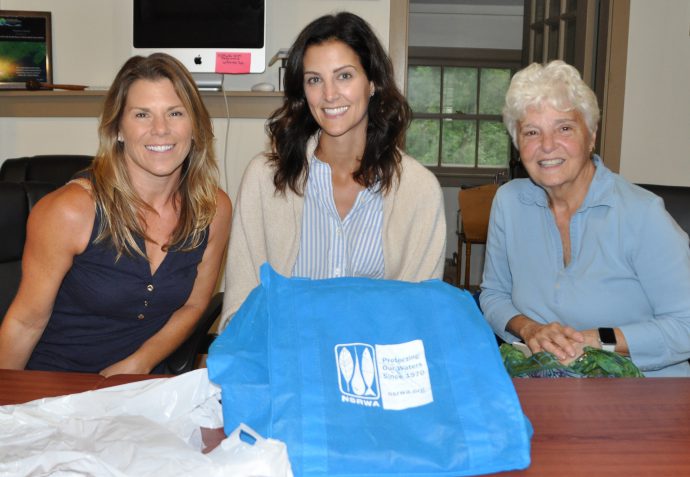Inspired by the Marshfield plastic bag ban, citizens in Pembroke brought their own propsal to town meeting and it passed by a narrow margin Tuesday night, October 23. Scituate residents have also taken up the cause. Please attend Scituate’s Fall Special Town Meeting on November 14, and support the ban to help protect our local waters! And don’t forget to stop by the NSRWA office to get your free recyclable shopping bag!
Read more in Should We Ban Plastic Bags? by Kezia Bacon, Correspondent
The Responsible Exercise of Freedom: Support the Plastic Shopping Bag Ban
A bylaw banning thin, disposable plastic shopping bags has been proposed for Pembroke’s and Scituate’s fall town meetings. Some in opposition to the measure voiced concern that such a ban takes away their personal choice and, along these same lines, state that we have “too much government regulation”. Others, supportive of the ban, often express concern over the damage these bags are doing to our world and feel a responsibility to themselves and to future generations to try to do something to reduce or eliminate the negative impact.
This struggle to balance personal rights with responsibility for the broader good of our communities, for future generations and for our world, has been one of the central philosophical and political issues vexing the citizens of our nation since its inception.
Over regulation, just like anything done to excess, is generally wasteful and at times harmful. However, it was government regulation that banned Freon, which was responsible for the hole in the ozone layer that has now begun to close. It was government regulation that cleaned up Boston Harbor to the point where we can now swim and fish in it. It was government regulation that eliminated DDT, a pesticide tied to many serious harmful impacts to human and animal life. Good environmental regulations do good things and not regulating could at times lead to perhaps irreversible harm.
The Case for Intervention
The need for regulation is significant when considering the impact of disposable plastic bags. These bags are polluting our oceans. These bags are killing millions of birds, 100,000 sea animals every year and affect over 300 species on land and in water. They do not biodegrade as they break down into micro particles that never go away (every piece of plastic that has ever entered the ocean is still there). The manufacture of these bags contributes to tons of greenhouse gases being released into the atmosphere annually. And according to the EPA, no more that 14% of these bags are recycled despite years of programming designed to promote voluntarily doing so.
So people have a decision to make. Do they recognize the magnitude of the problem and its seriousness? If you do, then you will support the Plastic Bag Ban. Will it call for some inconveniences? Yes, but we believe those sacrifices to be minimal compared to the cost of the continued degradation of our environment.
Yes, if you forget to bring your reusable bag, it is frustrating. However, the primary reason most of us forget is because it’s been made easy not to remember. That is, if we realize we forgot our bag, we promise ourselves to do better in the future and just take the plastic. But if there is no plastic bag available, then the times we forgot to remember will quickly start to stick in our minds. And pretty soon our behavior changes. We just get in the habit of remembering. The transition is not hard and once done, it becomes second nature.
83 towns in Massachusetts have voted to ban the thin carryout shopping bags. Many more have similar bans coming before their voters this year and next. Soon the entire Cape and Islands may restrict these bags. Boston, Chicago, Washington D.C., NYC, LA and over 300 jurisdictions in the United States covering 60 million people have bans. 40 nations covering 4.5 billion people have restrictions on these bags. And more bans are being passed everyday.
So if you believe that personal freedom comes along with personal responsibility, that the two are inseparable, than you have a choice to make. We hope that once you understand the degree of the problem that exists, you will support this ban.
Article adapted with permission from Ken Stone, Plymouth plastic bag ban advocate.

